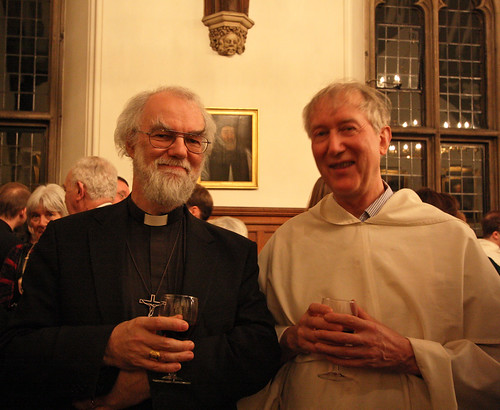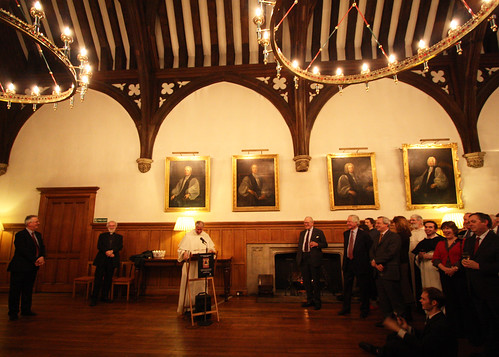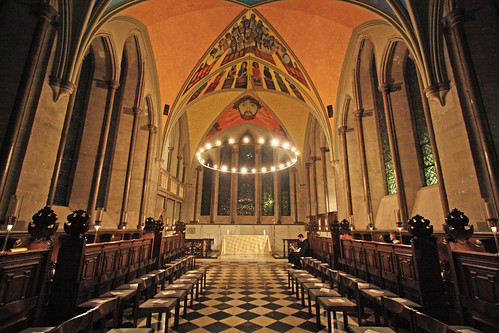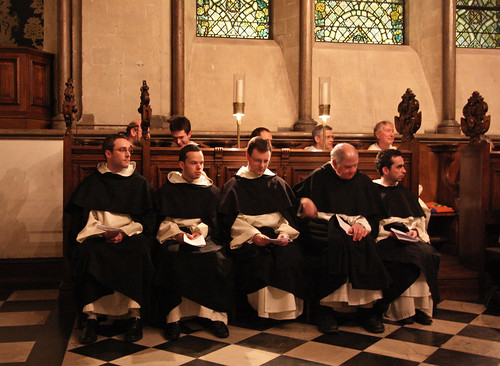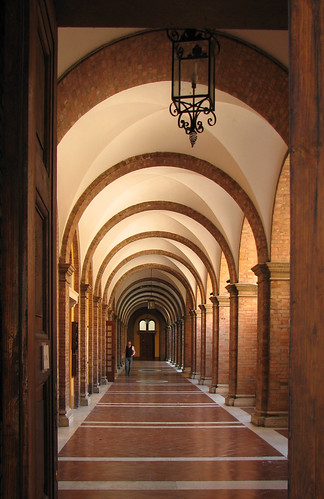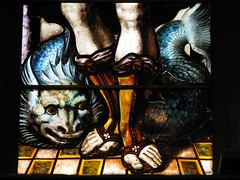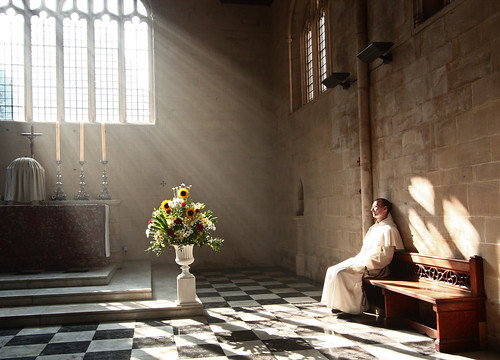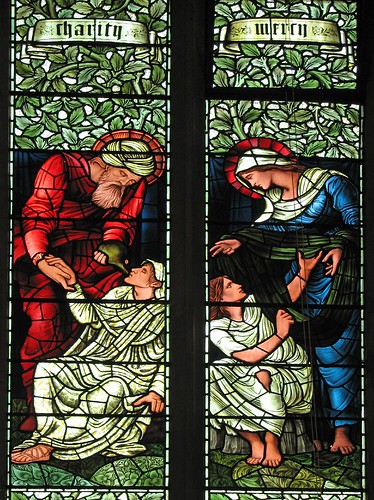"I get up at 7.43 every morning for Lauds. This is always a great challenge, especially in winter. Before joining the order, I used to hibernate for 6 months of the year, so it has taken me quite a while to adapt to getting up every day. It’s one of the sacrifices I have to make, but I receive many consolations. As it says in psalm 118 ‘Your promise is sweeter to my taste than honey in the mouth.’ As someone who very much loves honey, I find this imagery delightful, and it’s also very true.
"I’m currently studying philosophy and theology and I’m enjoying it very much. It’s really giving me the confidence to preach the Gospel. I’ve still got a lot to learn. In preaching classes, I’m constantly being reminded to speak up, but I find this very difficult without sounding like I'm growling. Still, the brothers are very encouraging.
"It’s taken a little while getting use to the Dominican habit, but it’s actually very comfortable. I do tend to get a few stares when I wander around Oxford , and occasionally I get people shouting out comments like ‘Super Ted.’ But the Dominican habit has become an important part of my identity and I think it’s an important eschatological sign.
"I’ve no idea what I’ll end up doing in the Order once I’m ordained - I’ll go where I’m told. Still, I miss living in the forest, so if I was given a choice, I’d love to be the chaplain for the Dominican sisters who are located in the New Forest ."

 Snakes have a terrible reputation. Their anthropomorphic representations such as Kaa, The Lady of the Green Kirtle and Lord Voldemort, are always sly, cunning and evil characters. The Bible is bookended by the cunning serpent in Genesis and the “ancient serpent called the devil, or Satan, who leads the whole world astray”, in the Book of Revelation. Even Our Lord insults the Sadducees and Pharisees by calling them “serpents and a generation of vipers.” It is no surprise that Christians have often represented sin using the image of a serpent.
Snakes have a terrible reputation. Their anthropomorphic representations such as Kaa, The Lady of the Green Kirtle and Lord Voldemort, are always sly, cunning and evil characters. The Bible is bookended by the cunning serpent in Genesis and the “ancient serpent called the devil, or Satan, who leads the whole world astray”, in the Book of Revelation. Even Our Lord insults the Sadducees and Pharisees by calling them “serpents and a generation of vipers.” It is no surprise that Christians have often represented sin using the image of a serpent.
 John is the only evangelist to narrate the story of Jesus’ act of bringing the dead Lazarus back to life, although both Mark and Luke give examples of how Jesus restored life to the dead (Mark 5:23-23, Luke 7:11-17). There is, however, something particularly dramatic about the story in John. Here is a man who lay dead for four days and whose body had already started to decay. The raising of Lazarus represents the last and the greatest of the seven miracles or ‘signs’ in John’s Gospel. After this event no further miracles are recorded by John until the Lord’s own Resurrection. In fact, the ‘sign’ of Lazarus serves in a way to prepare people for the coming death of Jesus and to point to his conquest over death in the Resurrection.
John is the only evangelist to narrate the story of Jesus’ act of bringing the dead Lazarus back to life, although both Mark and Luke give examples of how Jesus restored life to the dead (Mark 5:23-23, Luke 7:11-17). There is, however, something particularly dramatic about the story in John. Here is a man who lay dead for four days and whose body had already started to decay. The raising of Lazarus represents the last and the greatest of the seven miracles or ‘signs’ in John’s Gospel. After this event no further miracles are recorded by John until the Lord’s own Resurrection. In fact, the ‘sign’ of Lazarus serves in a way to prepare people for the coming death of Jesus and to point to his conquest over death in the Resurrection. Just before the passage that we read in today’s Gospel, Jesus had been preaching during the Jewish festival of booths which commemorated the wandering of the Jewish people in the wilderness for forty years. Jerusalem is packed with pilgrims so Jesus has a large audience. We see that many Jews were deeply impressed by the substance of Jesus’ words. They recognised at once that what he said came from God for they felt that he was at least a prophet if not indeed the long awaited Christ, or anointed one. But others could not see this at all. Jesus did not fit into their fixed notion about what the Christ would be. He obviously does not fit into their expectations or categories.
Just before the passage that we read in today’s Gospel, Jesus had been preaching during the Jewish festival of booths which commemorated the wandering of the Jewish people in the wilderness for forty years. Jerusalem is packed with pilgrims so Jesus has a large audience. We see that many Jews were deeply impressed by the substance of Jesus’ words. They recognised at once that what he said came from God for they felt that he was at least a prophet if not indeed the long awaited Christ, or anointed one. But others could not see this at all. Jesus did not fit into their fixed notion about what the Christ would be. He obviously does not fit into their expectations or categories. There are interesting links to be made between the first reading and the Gospel. In the first reading we see Moses pleading, interceding for the people of Israel, that God might show them mercy. Today's psalm also speaks of Moses standing 'in the breach' between the people and God, so that God might 'turn back his destructive wrath'. It is then interesting to find Jesus saying in the Gospel that the people will be accused by Moses. What is going on? So often we read how the people doubted the message that Jesus brought, a message that was preached not only by what he said, but by what he did, through his works of healing, and of ministering forgiveness. All these things point towards who Jesus is, and to the Father whom he reveals. But the people just don't get it ...
There are interesting links to be made between the first reading and the Gospel. In the first reading we see Moses pleading, interceding for the people of Israel, that God might show them mercy. Today's psalm also speaks of Moses standing 'in the breach' between the people and God, so that God might 'turn back his destructive wrath'. It is then interesting to find Jesus saying in the Gospel that the people will be accused by Moses. What is going on? So often we read how the people doubted the message that Jesus brought, a message that was preached not only by what he said, but by what he did, through his works of healing, and of ministering forgiveness. All these things point towards who Jesus is, and to the Father whom he reveals. But the people just don't get it ...




 Our Lord and Moses are both very clear: It is not enough to keep God’s commandments but we must teach them to others. Before we may teach however, we must be taught. The season of Lent allows us to refresh our faith and understanding of the Law that we may pass it on with greater vigour. During Lent we should go back to the “class-room” of the true teacher. Jesus completes the Law and he gives it purpose. It is not enough to know every dot and stroke and to know all the rules. We need the light of Christ to help us understand the true objective of the law; to bring us nearer to God. Through prayer, fasting and giving, we can refresh or even rediscover this Light in our lives. When we live in the true spirit of the Law, we must “demonstrate to the nations” and be examples to the world. The rewards of living the law in the spirit of Christ are infinite and we must pass them on. Our Lord promises that all, who keep the Law and teach it, shall be great in the Kingdom of Heaven. Therefore we must prepare ourselves to go out and proclaim the risen Christ to the world.
Our Lord and Moses are both very clear: It is not enough to keep God’s commandments but we must teach them to others. Before we may teach however, we must be taught. The season of Lent allows us to refresh our faith and understanding of the Law that we may pass it on with greater vigour. During Lent we should go back to the “class-room” of the true teacher. Jesus completes the Law and he gives it purpose. It is not enough to know every dot and stroke and to know all the rules. We need the light of Christ to help us understand the true objective of the law; to bring us nearer to God. Through prayer, fasting and giving, we can refresh or even rediscover this Light in our lives. When we live in the true spirit of the Law, we must “demonstrate to the nations” and be examples to the world. The rewards of living the law in the spirit of Christ are infinite and we must pass them on. Our Lord promises that all, who keep the Law and teach it, shall be great in the Kingdom of Heaven. Therefore we must prepare ourselves to go out and proclaim the risen Christ to the world.





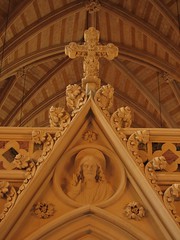

 I find today’s gospel quite funny, it has the air of a black comedy about it, mainly due to the misunderstandings of the disciples. In today’s Gospel Jesus is journeying to Jerusalem with his disciples. On the way he breaks the news of his impending death. He tells them that when they reach the city he, Jesus, will be handed over to the temple officials and the Romans to be killed. He also tells them that he will rise again on the third day.
I find today’s gospel quite funny, it has the air of a black comedy about it, mainly due to the misunderstandings of the disciples. In today’s Gospel Jesus is journeying to Jerusalem with his disciples. On the way he breaks the news of his impending death. He tells them that when they reach the city he, Jesus, will be handed over to the temple officials and the Romans to be killed. He also tells them that he will rise again on the third day.
